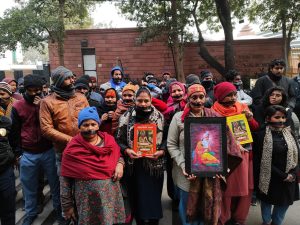How Women Farmers in Punjab Mobilised Against The Farm Laws
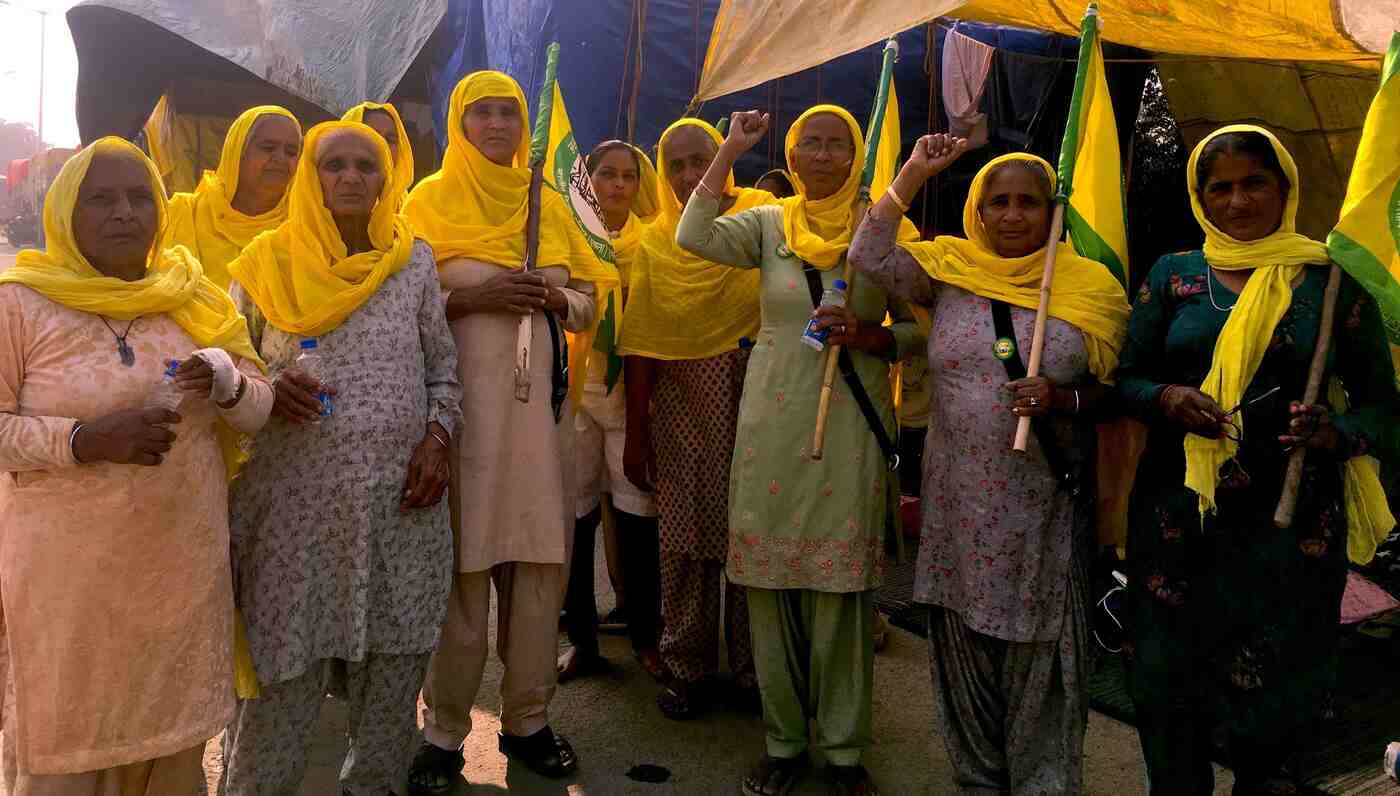
“These capitalists will ruin us,” thundered Charanjeet Kaur, a thirty nine year old farmer with a medium landholding of 12 acres (4 hectares) from Wara Bhaika village in Faridkot district of Punjab.
“Instead of bridging the gap between the rich and poor, government is trying to get rid of the poor altogether,” she told BehanBox on a mid December morning at Tikri on the Delhi-Haryana border–one of the two sites of the groundswell of protests against the new farm laws legislated by the Government of India.
Sat beside her, Manjeet Kaur (40), a small farmer with 2 acres (0.8 hectares) landholding and a fellow resident of the village, is worried about the deregulation of the Agricultural Produce Market Committees (APMCs), popularly known as Mandis, under the new Acts.
“Women farmers will suffer the most with these laws,” she said. “Currently, we sell our produce at the Mandi in our village. Once these are dismantled, is it possible for small farmers like me to come to Delhi and sell our farm produce?”, she asks.
33% of farmers in Punjab are marginal or small, with land less than 2 hectare according to the latest Agriculture Census (2015-16). Only 5% are large farmers with land more than 10 hectares.
On December 1st, Charanjeet and Manjeet Kaur along with 4o women farmers from Faridkot district set out for Delhi on a tractor trolley to join tens of thousands of farmers from Punjab, Haryana and other parts of India, to protest against the new farm laws. For the last one month, they have braved the bitter cold in Delhi, pitching their tents alongside the National Highway no. 44, with barely any belongings or indeed sanitation facilities.
The farmers stationed in Tikri and Singhu border are protesting against three farm laws — The Farmers (Empowerment and Protection) Agreement on Price Assurance and Farm Services Act, 2020, The Farmers’ Produce Trade and Commerce (Promotion and Facilitation) Act, 2020 and The Essential Commodities (Amendment) Act, 2020. Promulgated as ordinances on June 5 2020, they were enacted into law on 27 September, 2020 after they received presidential assent.
“Collectively, these three farm bills are designed to reduce barriers that diverse agri-food supply chain actors face in connecting to farmers. They aim to do so by reducing reliance on traditional APMC-based intermediaries and by creating a unified national market”, wrote Sudha Naraynan, an agricultural economist at the Indira Gandhi Institute of Development Research.
“Despite the titles of the bills highlighting the ‘farmers’, rather than focusing directly on farmer welfare all three bills rely overwhelmingly on supply chain actors to take advantage of the new rules and share their gain with the farmers,” she adds.
Farmers and farm unions across India have been mobilising for months towards the protests against these laws.
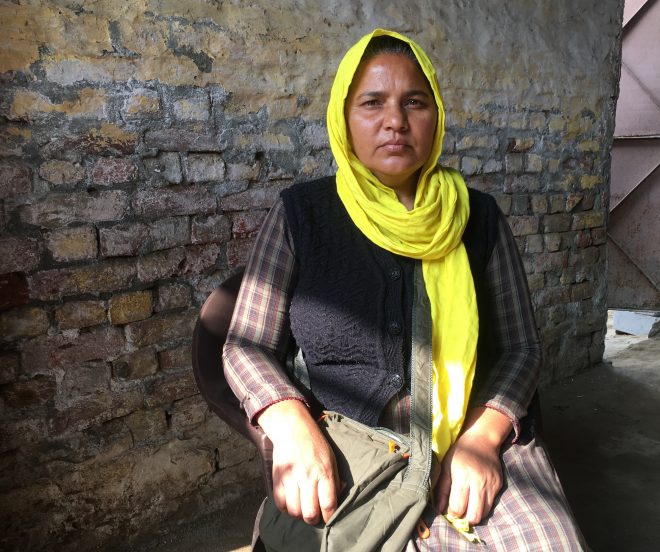
“We have come to Delhi to get these three black farm laws repealed along with The Electricity (Amendment) Bill, 2020 and the stubble burning ordinance. We also demand for a guaranteed minimum support price (MSP) regime and a proper law to facilitate ration to the poor in the cities and villages”, said Harinder Kaur Bindu, general secretary of Bhartiya Kisan Union (Ekta Ugrahan), the largest farmer’s union in Punjab.
“We will not leave until it is done”, she said.
Women farmers, landless Dalits and agriculture labour across classes and castes have played a seminal role in the ongoing farm protests.
Women Farmers Mobilise In Punjab’s Towns And Villages
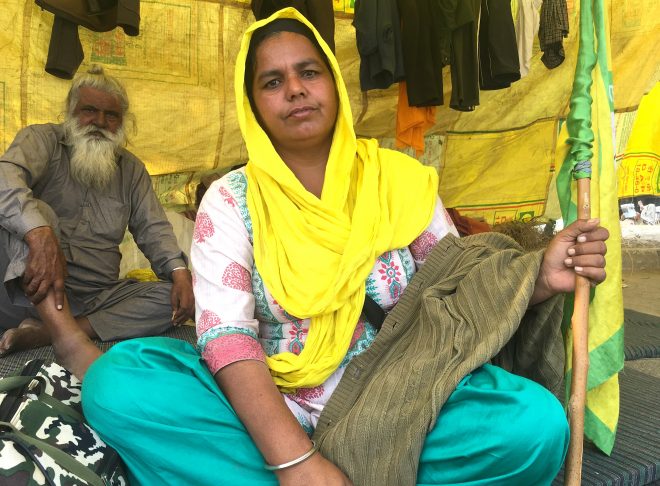
“It was soon after the lockdown was announced in March, when everyone in the villages began talking about the farm bills,” recalls Manjeet Kaur. “We were afraid that the government would take advantage of the Coronavirus situation to pass the bills in a hurry,” she said.
Farmer unions across Punjab were holding gatherings in the villages, explaining the impact of the farm bills since July 2020. The unions carried a tractor march and forced the government of Punjab led by Captain Amarinder Singh as well as the opposition Shiromani Akali Dal (SAD) to take a stand against the laws.
“Women are participating in equal numbers in these protests. We held special meetings across villages to explain the impact of these bills”, Bindu told BehanBox. Many farm unions in Punjab have active women’s wings.
“Within the villages, mobilisation against the farm bills picked momentum in August. Thereafter, the agitation spread outside villages to corporate sites like Vedanta’s thermal plant, malls and warehouses of Andani and Ambani, Reliance petrol pumps and toll plazas”, she said.
“Whenever women met, even at Gurudwaras, we were discussing the farm bills among ourselves,” remembers Manjeet Kaur.
Everyday, from October onwards, Manjeet and Charanjeet Kaur would take a tractor to the Jeeda toll plaza, 4.4 kms away from their village Wara Bhaika, to talk about the farm laws between 11:00 AM and 4:30 PM.
In protest sites across Punjab, effigies of Prime Minister Narendra Modi were burnt. Women performed ‘Pit Siyappa’ (mourning songs) for him. In these months, Bindu says, she has seen women prioritise the struggle over their household responsibilities.
At Singhu border, BehanBox met 70-year-old Laab Kaur from Chhajli village in Sangrur district who had joined the rail-rokko call on the Delhi-Ludhiana track but felt compelled to “knock on the doors of Delhi”, as she put it, after all their demands were overlooked by the central government.
“The kind of energy, spirit and courage with which women have taken part in the protest — it has shaken the Modi government,” Bindu says, “The government, which had once refused to move an inch on these ‘black farm laws’, is now holding meetings with us to suggest amendments.”
Government has, since, met the farmer union leaders for six rounds of talks. The last round of talks were held on December 30, where a consensus was reached on stubble burning and dropping the provisions of the draft Electricity (Amendment) Bill, 2020, but without any headway on the repeal of farm laws or a guaranteed MSP regime. The next round of talks will be held on January 4.
“On behalf of all the women farmers, we want to tell this government that we are not here to haggle. We are here to get these laws entirely repealed
—Harinder Kaur Bindu
Even as many women gather at the Tikri and Singhu borders, many others continue to protest within their villages and district headquarters.
“Haqa leyn jo lad de log, jelan toh nahi darde log. Ki karan ge jaila-thane, logan deyan parde k jane?”
(Those who fight for their rights are not afraid of the prisons. What will these prisons do when we will keep flooding?) — is a rallying cry women of protestors often heard at Tikri and Singhu borders.
Why Women Farmers Oppose The Farm Laws
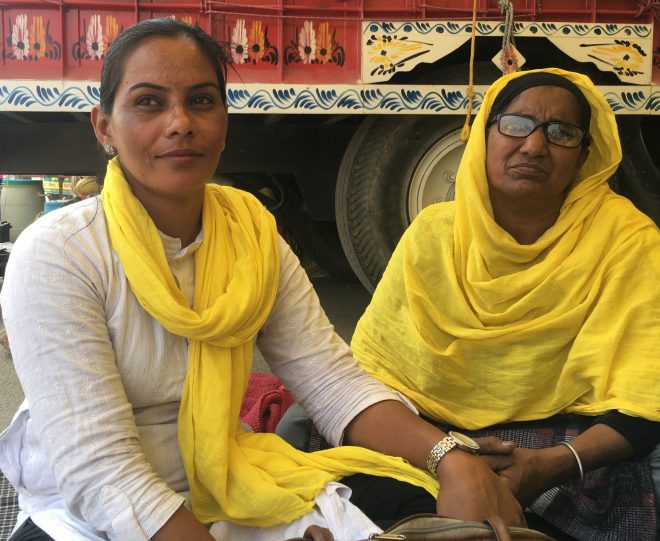
The primary concern of women farmers with varying landholdings is the deregulation of the APMCs under The Farmers’ Produce Trade and Commerce (Promotion and Facilitation) Act, 2020. Mandis were introduced to prevent distress sale by farmers to their creditors and to protect them from the exploitation of intermediaries by ensuring better prices and timely payments.
“Women farmers, with their poor mobility and access to transport facilities, are especially on an unequal footing when it comes to traveling to another place to trade their produce or bargain around better prices. What women farmers need is proximal markets but with oversight to protect them from exploitation by buyers and traders,” said Mahila Kisan Adhikaar Manch (MAKAAM), an umbrella organisation working for the rights of women farmers.
“Currently, the Mandi is just 2 Kms away from my house. I can go there even at night”, said Manjeet Kaur.
Apart from their proximity to the villages, APMCs perform a crucial role in signalling prices, which gave bargaining power to women farmers to negotiate prices even when they sold outside the Mandis, we reported in October 2020.
“We sell a quintal of rice for Rs. 2,200 now. If the Mandi Board is dismantled, we may have to sell our harvest for half the price. See what happened in Bihar? Sanu is gal di wadi tension hegi aa (I am very worried about this),” she said.
Bihar removed APMCs, allowing the free market to decide the price of farm produce in a bid to spur private investment in agriculture and better prices for crops.
However, a study by the National Council of Applied Economic Research (NCAER) in 2019 noted that prices of farm produce crashed and unregulated middlemen and traders forced farmers to pay for their crops to be sold after the abolition of APMC Act in Bihar.
Manjeet’s family currently earns Rs 10,000 per acre from their 2 acre farm after spending around Rs 20,000 as input costs. They save on electricity, as Punjab gives 200 units of free electricity every month. She is worried that the The Electricity (Amendment) Bill, 2020, which proposes a reduction in subsidies and determines the tariff on the basis of cost of supply, will add to their burden.
“The move will have a direct impact on rural customers, especially agricultural ones, said Tejal Kanitkar, an associate professor at the National Institute of Advanced Studies, Bengaluru.
Charanjeet Kaur is worried about the loss of her land. Her family of five is dependent on the Rs. 50,000 per acre yearly income they earn from leasing out their 12 acre land, ever since her husband suffered injuries to his spinal cord.
“Our only source of livelihood is our land. If it is taken away from us what will we be left with?” she asks.
The Farmers (Empowerment and Protection) Agreement on Price Assurance and Farm Services Act, 2020 introduces contract farming, under which farmers will produce crops as per contracts with corporate investors for a mutually agreed price. The Act proposes any disputes to be resolved by the sub-divisional magistrate and district collector instead of the courts.
“Farmers often fear written contracts and even when they don’t, they are unlikely to be able to seek formal dispute resolution.There is also a fear that big businesses might embrace contract farming not so much to guarantee markets or prices but to exercise indirect control over farmland in the guise of securing farmer services,” noted Narayanan.
“ The harvest on our land will be purchased at a lower price. When everything runs into losses, these capitalists like Adanis and Ambanis will come to us and offer us a price for our land. When we ask for our land back, they won’t return”, said Charanjeet Kaur. “ These laws don’t even allow us to file a case in this matter. Zameen toh chali gae na (Our lands will be gone now).”
Besides, it will set women farmers in a weak bargaining position while entering into contract farming. “They will barely be in a position to afford the time and financial resources to get their problems redressed under the new framework,” stated MAKAAM.
The Essential Commodities (Amendment) Act 2020, which removes cereals, pulses, oilseeds, edible oils, onions and potatoes from the list of essential commodities and also removes the limit on stocks and storage of these commodities opening the gates for large businesses is another area of concern.
“If the farm produce is purchased by the corporates, how will the government
provide ration to those below the poverty line? Everyone has understood this,” said Rajinder Kaur (42), a Dalit landless agriculture wage worker from Gurditpura village in Patiala district.
Sukhpreet Kaur, a second-year Masters in Economics student of Government Brijindra College in Faridkot district fears that the freedom and agency of young women like her will be lost due to these laws. Young women students have been creating awareness using technology and holding discussions in villages over the past months. At Tikri and Singhu, they often take the stage to address the protestors.
“In a patriarchal society like ours, girls do not get the first preference for education anyway. With falling farm incomes, girls like us who made progress will be pushed back to household chores or raising children”, said Kaur, who comes from a family of agriculture labourers who had to face several hardships to put her through to university.
Landless Dalits and Farm Labour
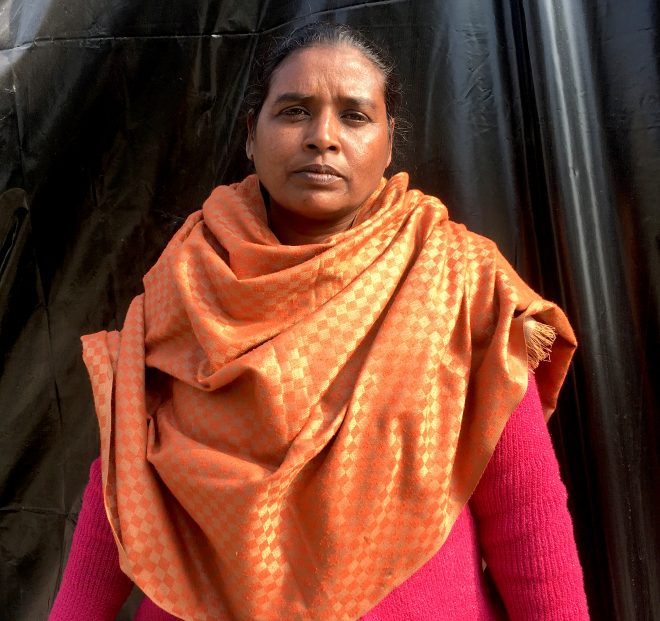
These laws, say union leaders like Bindu, will not just affect farmers but everyone dependent on land including women agriculture labour.
“The state of farm labour will get worse with time,” said Rajinder Kaur.
Rajinder Kaur (42) was only 14, when she started working as a daily wage worker on Punjab’s cotton fields. At the time, she earned a meagre Rs 25 as daily wage for picking 50 kilos of cotton.
“Earlier everything was done by hand. Cotton picking in districts like Bathinda and Sangrur would go on for about three months. Wheat harvest was done by hand too. It all stopped after machines took over,” she said.
Since then, Rajinder Kaur has depended on daily wage work under the Mahatma Gandhi National Rural Employment Guarantee Act (MNREGA), to support her family. Even though the average daily wage in Punjab is Rs. 258, she has never received a full wage.
“Despite working all day long, they would pay us anywhere between Rs 190 to Rs. 220. They say the budget has shrunk,” she said.
Gurmukh Singh, district secretary of Zameen Prapti Sangharsh Committee (ZPSS) in Sangrur district raises concerns of Dalit farmers and farm labour over the farm laws. ZPSS is an umbrella organisation working for the land rights of Dalits in Punjab since 2014.
“Dalits still struggle to get hold of the land they are entitled to under various government Acts. With hardly any industry in the state and no land of their own, these laws will drive up unemployment for the landless Dalits,” he said.
Punjab has the highest percentage (32%) of scheduled castes (SC) population in the country. 36.7% of rural households in the state are scheduled castes, according to the Socio-Economic and Caste Census (SECC) 2011 . 64.5% of households in rural areas are landless.
In 1961, Punjab passed the Punjab Village Common Lands (Regulation) Act, reserving one-third of agricultural village common land (also known as Shamlat land) to be leased annually to the scheduled castes. Shamlat land is concentrated in 8000 villages in the six districts of Patiala, Gurdaspur, Ludhiana, Kapurthala, Fatehgarh Sahib and Amritsar.
The implementation of the Act has been far from satisfactory.
Around 26,000 families in the state, mostly Dalits, depend on this land for their livelihood, according to a survey by ZPSS. “ In reality, however, many Dalit families failed to acquire land due to the dominance of upper castes,”said Singh.
In January 2020, Punjab cabinet approved an amendment allowing panchayats to sell Shamlat land to industrial houses, entrepreneurs and companies for setting up micro, small and medium industrial units. The move has been put on hold after protests by Dalit farmer unions in the state.
Women, landless Dalit and marginalised farmers have been playing an important part in reclaiming their rights over village commons and demanding an end to caste based sexual violence in recent agrarian mobilisations in Punjab writes Navsharan Singh.
“We feel we have broken enough stones and laboured on fields of others. It is now time for our children to get educated and do something for us. But the future looks bleak. Bhavishya dhundla dikhda hai,” said Rajinder Kaur.
Deepening Agrarian Distress and Farm Suicides
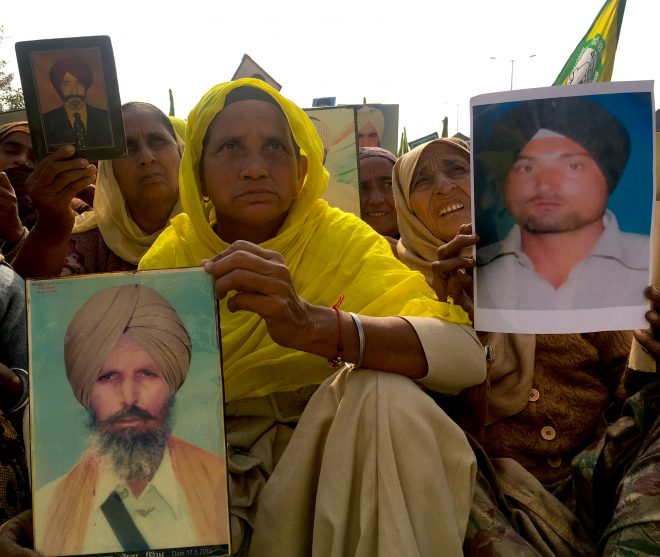
Farmers in Punjab and Haryana were among the main beneficiaries of the Green Revolution in the 1960s. Having secured land tenures during the period, they favoured high-yielding varieties of wheat and paddy over traditional crops such as maize, millets and pulses. Post the euphoria of the Green revolution, studies show that decline in productivity and increased costs of production have pushed farming families into a spiral of debt.
The average outstanding loan per agricultural household in Punjab is Rs. 1,19,500 — third highest in the country–according to data from the Situation Assessment Survey of Agricultural Households in India published by the National Sample Survey Organisation (NSSO).
“Farmers took to high-yielding varieties because of the agricultural marketing system that was put in place in the region: the mandi, the very same system that the new laws will undermine”, writes Shreya Sinha, an agrarian researcher at the Department of Geography, University of Cambridge. “Reeling under chronic indebtedness, they are quitting agriculture altogether, or taking recourse to drugs, or sometimes, dying by suicide.”
During agrarian distress, women of the farming households where male members die by suicide remain invisible to the state.
“ After my husband died by consuming poison in 2010, I was left fending for myself and my two sons. I was working on the fields of others or asking neighbours for help”, Charanjeet Kaur (50) a farm worker from Maluka village in Bathinda district told BehanBox.
“I was not compensated for our loss. Even the widow pension I used to get has stopped”, she said as she sobbed while clutching her husband Gora Singh’s portrait to her chest at the Tikri border on 16 December– a day when where women of farm families where men died by suicide had gathered to protest against the new farm laws.
Farm suicides have increased by 12 times between 2014 and 2019 according to data from the National Crime Records Bureau (NCRB). Experts, however, believe these numbers to be much higher. According to a door-to-door survey conducted by three universities of Punjab, 16,600 farmers and farm labourers died by suicide in the state between 2000 to December 2016–an average of over 1,000 per year.
“The government gives three months to prepare and show all the documents related to farmers’ suicide. If the family is late to submit the document by a day, they are not compensated,” said Kiranjeet Kaur, a 25-year- old activist from Mansa district who runs Kisan Mazdoor Khudkushi Peedit Parivar Committee, a support group seeking justice for farm families whose members have died by suicide due to debt. She set up the group after her father died by suicide unable to cope with the loss of their cotton crop and an insurmountable debt of Rs 8 lakhs.
The paperwork needed to seek compensation is tedious. In her own case, she had to negotiate the system for 2 years before the family received compensation of Rs 3 lakhs for her father’s death.
It is worse for farm labourers.
“Since they don’t own land, they do not get institutional credit and are forced to borrow from private moneylenders. Women in these families do not have any paper proof to show to the government. Such women mostly end up working as bonded labourers for the rest of their lives,” said Kiranjeet.
These days, Kiranjeet is carrying out ‘Punjab Bacho Kafla’ (Save Punjab Campaign)–a 92 day long campaign between November 1 to January 31– to educate women and their families of farmers who died by suicide about the farm laws.
“ These families are already under strain. These laws will also take away the hope they are left with.”
“Josh de naal, hosh vi zaruri hai (Along with the zeal, it is important to be aware too)”, she says.
We believe everyone deserves equal access to accurate news. Support from our readers enables us to keep our journalism open and free for everyone, all over the world.

